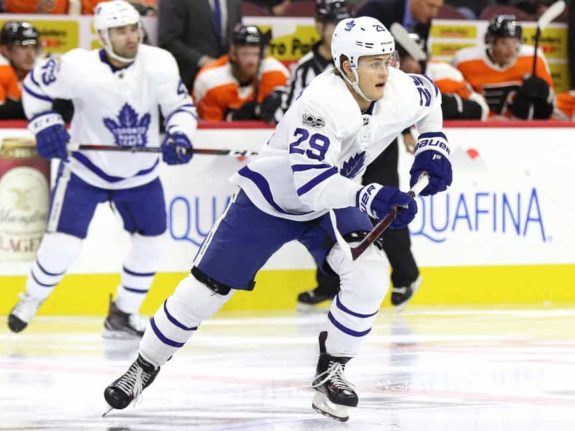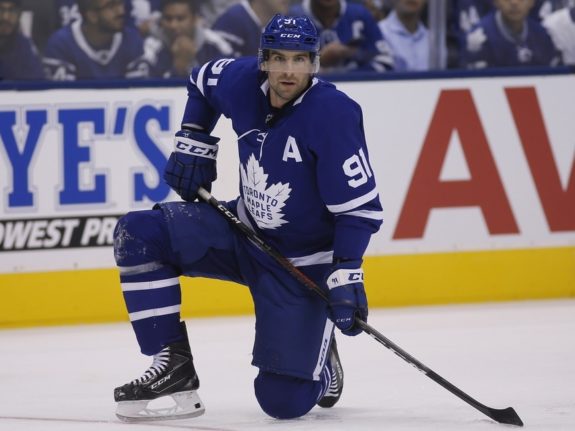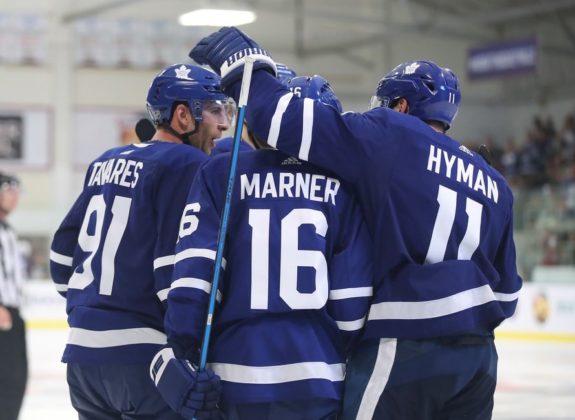The Toronto Maple Leafs face two problems with William Nylander. First, he is an unsigned restricted free agent, who hasn’t yet come to terms on a contract extension with the team. Second, if Nylander does sign, as early as next year, the Leafs might face a serious salary cap issue.
With the delay in getting a deal done, both the media and anxious Maple Leaf fans have started to ask: “Should the Maple Leafs trade William Nylander?”

Here are the facts. The Leafs are already a good team – maybe, this year, a great team. Auston Matthews is a superstar: some in Toronto suggest as good as the Edmonton Oilers’ Connor McDavid. Matthews can score, pass, and bring forth magic. From a fan’s point of view, you don’t want to take your eyes off him. Mitch Marner is a playmaker. He makes things happen.
But, what exactly is William Nylander to the Maple Leafs future? Although he may not be in the same league – speaking of individual skills – as his teammates, he could be a key part of the Maple Leafs’ push forward and he’s got undeniable talent with a ceiling that’s difficult to predict.
So what to do?
Reality #1: The Leafs Don’t “Need” Nylander
Despite his obvious talent level, the Leafs might not need Nylander to win everything this year. In reality, they could let him sit and stew. As others have said, at some point, it’s Nylander who has to budge and not the Leafs. If he wants to play in the NHL this season, he’s got to lower his demands and while it wouldn’t benefit anyone to keep a 60-point forward out of the lineup, the Leafs are being touted as this year’s Stanley Cup favorite, likely with or without him.

Adding John Tavares in an area where the Maple Leafs were already strong only made Nylander less imperative of a signing for the team. Some argue the organization should have signed a top-tier defender instead of a center, but could Toronto move Nylander to get the defenseman they really need? Frankly, he’s expendable.
Related: Maple Leafs’ Dubas Was Foolish Signing Tavares
Reality #2: The Definition of Losing a Trade Changes
When you look at how most define making a “good NHL trade”, moving Nylander would probably not qualify. First, teams forced to trade a top-six forward almost never get an equal return. Second, there might not even be similar return out there to be had.
While teams will have interest in Nylander, there probably isn’t a team willing to give up a defenseman as valuable on the blue line as Nylander is valuable as a forward. Instead, where GM Kyle Dubas will try to “win” the trade is by continuing to build a winning culture and a winning team. He wants the right people on the bus; and, if Nylander is seen to be self-centered and not team-oriented, perhaps he is not the right people. Dubas will eventually have to decide if Nylander is buying into the Leafs as a “team,” or not? And, for Dubas – young at his job and desiring to cement his leadership – is this the time to send a message? If you’re not in, then you’re out.
Reality #3: Dubas Needs to Consider the Long-Term
It is Dubas’ mandate to team-build and consider the long-term salary cap implications that has likely forced the Leafs to stay so planted in their offer. That Nylander is seeking a multi-year deal (rumoured by some to be as high as $8 million per year), pushes Dubas to remember that Auston Matthews and Mitch Marner become restricted free agents next summer. Then, the salary cap really might become an issue.

The team cannot afford to overpay the first big free agent to come up for an extension. Should they, everyone will want a piece of the pie and both Marner and Matthews are arguably better players worth more than whatever Nylander will eventually get. Perhaps the Leafs already set the precedent of overpaying free agents with Tavares’ $11 million per year contract, but the team doesn’t see Tavares and Nylander in the same light.
Related: NHL Rumors: Maple Leafs, Oilers, Ducks, More
Reality #4: The Leafs Time is Now
Leaf fans are becoming increasingly frustrated and anxious. It’s close: they feel it. Their time is now and, rightfully, they want the best team going forth. Whether Dubas trades Nylander or keeps Nylander, fans will understand if the team wins. Dubas can always “sell” a trade if it improves the team. Nylander definitely holds enough value.
Reality #5: This Year’s Salary Cap
The Leafs don’t have a cap problem this year. Currently, the team has plenty of space to re-sign Nylander for $6 to $7 million, and leave millions in cap space going into this season. They can be set for this season without trading a single asset to stay under the salary cap.
That said, would moving Nylander allow the Leafs to make more than one move that would improve the club in more than one area?

In both hockey and in life, there is never any time like the present and there are unpredictable factors that could change what happens to the Leafs over the next few seasons. Perhaps the concept of “not mortgaging the future” makes sense in life, but it makes less sense in a world where hockey’s salary cap floats in response to changing finances, where new players become available every year and where the team still has serious needs they’ve not yet addressed.
Simply stated, because the Leafs can win the Cup this year, they need to go all in this year. Winning the Stanley Cup is so very rare that you throw all your toys at it if you have the chance. Toronto can always seek a forward next season should they feel they need one.
Related: Tavares Takes Pressure off Maple Leafs’ Young Stars
What Probably Will Happen With Nylander
Indeed, good money says Nylander will sign. His current stubbornness is common to the huffing and puffing that these days accompanies salary negotiations. Even if he isn’t in the opening lineup, he wants to be on the bus when it reaches the end of the line. Young as he is, he knows how tough it is to win a Stanley Cup.
Kyle Dubas will be patient. Because he is intelligent, he will also be realistic. Furthermore, coach Mike Babcock has grizzled-by-experience leadership. If he hasn’t seen it all, he’s seen most of it. He, too, is willing to wait and is prepared for an eventual Nylander return. That’s not a good combination for the player holding out.
Kyle Dubas will probably sign his forward to a long-term contract. The question is, is this what’s best for Toronto? While the hockey world has been waiting for a negotiations to finally find some kind of common ground, people are starting to ask if the team is better off trading a player everyone once saw as critical to the team’s future?
From where I sit, it’s not an invalid question.